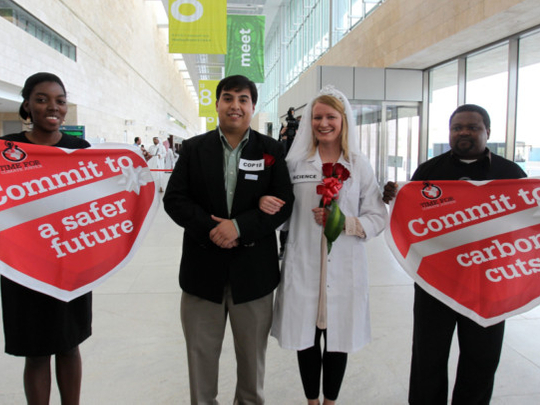
Doha, Qatar: Global warming will have dire consequences for the Middle East and North Africa, with even hotter and drier conditions devastating everything from agriculture to tourism, a World Bank report said on Wednesday.
On current trends, average temperatures in Arab countries are likely to rise by as much as three degrees Celsius (5.4 Fahrenheit) by 2050 - and double that for night-time temperatures, said the report released at UN climate talks in Doha.
Rainfall in the region with the world’s lowest endowment of fresh water is projected to become even more unreliable, and flash floods more frequent.
“The climate of Arab countries will experience unprecedented extremes,” warned the report.
“Temperatures will continue to reach record highs, and in many places there will be less rainfall. Water availability will be reduced, and with a growing population the already water-scarce region may not have sufficient supplies to irrigate crops, support industry, and provide drinking water.
“Climate change will not only challenge the status quo: it will threaten the basic pillars of development.”
The report was presented at the United Nations climate negotiations in Doha, Qatar, where nearly 200 delegates for the first time are in the Middle East to discuss cutting emissions in an attempt to ensure that global temperatures don’t rise more than 2 degrees C (3.6 degrees F) over what they were in preindustrial times.
The World Bank said climate change has, or soon will, affect most of the 340 million people in the Arab region - but the 100 million poorest, with fewer resources to adapt, will feel it most.
It will affect livelihoods - causing a cumulative drop in household incomes of about seven percent in Syria and Tunisia and 24 percent in Yemen, said the report.
All but six Arab countries already suffer from water scarcity, which is defined as less than 1,000 cubic metres (264,200 gallons) of water per person per year.
Climate change is expected to reduce water runoff by another 10 percent by 2050, while demand will grow by 60 percent.
No results
Meanwhile, a number of negotiators agreed that the first part of the UN Climate Change conference COP18 CMP8 negotiations have not resulted in any concrete decisions, especially in extending the Kyoto Protocol.
There was a voluntary agreement by the donor countries to provide $30 billion, and those countries have exceeded that, US negotiator Jonathan Pershing said. “The question of whether there is a new commitment that gets announced here is not the right question. The current discussions obligated us to look at a 2020 number. That’s what we agreed to do. They committed us as a downpayment in good faith to look at a $30-billion collective effort, and we have done more than that. In that sense I think we are doing what we agreed to do and what we’ve committed to do,” he said.
“At least someone came forward and put something on the table, regardless of the amount, at least we are inching forward in the right direction.” Ambassador Ronny Jumeau, from the Seychelles and part of the Alliance of small island states, said.
The major issue seemed to be that there was a lack of ambition from all countries when it came to the Kyoto Protocol. Pa Ousman Jarju from The Gambia and Chair of the least developed countries said: “We want something concrete, something robust to how to increase the level of ambition.”
Jumeau said that there was a focus on loss and damage during the negotiations, because in the past there was a fail in ambition in mitigation and a fail in ambition in adaptation and the consequences brought them to loss and damage and now they need to deal with it. He added that if nothing is done soon, they will have to consider relocation, as some of the islands will be destroyed and disappear.
Betts and Pershing said that the EU and the US are both committed to continuing to support the Climate Finance, which is set to help countries affected by climate change.
Jameau noted that just because of Hurricane Sandy, the governors of New York, New Jersey and Connecticut have asked the US federal government for about 83 billion dollars, “not for one year but one storm” , he added that typhoon that hit the Philippines was the 16th this year. Explaining that the money demanded for the fund, which is 100 billion dollars a year until 2020, was not a lot when compared to the hree states.
Jarju said he was confident that they will get the money, which he said was part of the package and that they will negotiate till the last minute to get it by the end of Doha.












